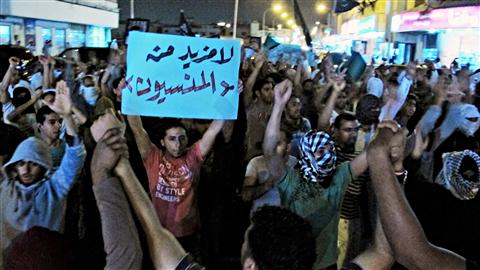Three Shiite demonstrators were injured, Thursday, March 10, in eastern Saudi Arabia by gunfire from the police, who tried to disperse a rally, according to a witness. Saudi officials have stated several times in recent days that the demonstrations were banned in the kingdom and that the police were authorized to intervene to enforce the law.
These incidents occurred on the eve of a call to protest launched on Facebook. The shootings have occurred while between six hundred and eight hundred people, including women, demonstrating in Al-Qatif to demand the release of nine prisoners Shia, said one witness, who requested anonymity.
"While walking in the heart of the city was completed, the soldiers started shooting at demonstrators, and three of them were injured," he said. The three injured men were hospitalized but their injuries were "moderate," the source said, that the shooting lasted about ten minutes. Inmates whose demonstrators demanded the release Thursday are nine people arrested in 1996 after the assassination of anti-American Khobar, in eastern kingdom.
The call for Friday claiming that "the leader and members of the Majlis al-Shura (consultative council appointed) be elected", "the release of political prisoners" and "freedom of speech and assembly" in the kingdom. In Riyadh, the situation was normal Thursday night, but police patrols were more numerous than usual, residents said.
Following appeals on Facebook, a few hundred people had already expressed last week in the east, where Shiites are concentrated, demanding the release of a cleric. This dignitary, Sheikh Toufic al-Aamer, was released on March 6 and twenty-six Shiites arrested during demonstrations last week have been released in recent days.
Shiites, concentrated especially in the eastern province, rich in oil, make up about ten percent of the population of Saudi Arabia. The community complains of marginalization in a country ruled by Wahhabism, a puritanical Sunni doctrine. In Washington, Deputy Adviser for National Security President Barack Obama, Ben Rhodes, said the U.S.
closely monitoring developments in Saudi Arabia, one of its main allies in the Middle East, and defended " universal values \u200b\u200b"such as the right to protest. The Saudi foreign minister, Prince Saud al-Faisal, had told reporters Wednesday the "rejection of any interference in internal affairs" of his country.
"Reform can not be done through demonstrations," he said, adding that "dialogue" was the best way for citizens to make their voices heard. 


These incidents occurred on the eve of a call to protest launched on Facebook. The shootings have occurred while between six hundred and eight hundred people, including women, demonstrating in Al-Qatif to demand the release of nine prisoners Shia, said one witness, who requested anonymity.
"While walking in the heart of the city was completed, the soldiers started shooting at demonstrators, and three of them were injured," he said. The three injured men were hospitalized but their injuries were "moderate," the source said, that the shooting lasted about ten minutes. Inmates whose demonstrators demanded the release Thursday are nine people arrested in 1996 after the assassination of anti-American Khobar, in eastern kingdom.
The call for Friday claiming that "the leader and members of the Majlis al-Shura (consultative council appointed) be elected", "the release of political prisoners" and "freedom of speech and assembly" in the kingdom. In Riyadh, the situation was normal Thursday night, but police patrols were more numerous than usual, residents said.
Following appeals on Facebook, a few hundred people had already expressed last week in the east, where Shiites are concentrated, demanding the release of a cleric. This dignitary, Sheikh Toufic al-Aamer, was released on March 6 and twenty-six Shiites arrested during demonstrations last week have been released in recent days.
Shiites, concentrated especially in the eastern province, rich in oil, make up about ten percent of the population of Saudi Arabia. The community complains of marginalization in a country ruled by Wahhabism, a puritanical Sunni doctrine. In Washington, Deputy Adviser for National Security President Barack Obama, Ben Rhodes, said the U.S.
closely monitoring developments in Saudi Arabia, one of its main allies in the Middle East, and defended " universal values \u200b\u200b"such as the right to protest. The Saudi foreign minister, Prince Saud al-Faisal, had told reporters Wednesday the "rejection of any interference in internal affairs" of his country.
"Reform can not be done through demonstrations," he said, adding that "dialogue" was the best way for citizens to make their voices heard.



No comments:
Post a Comment